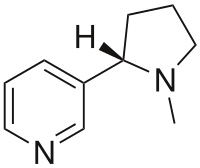
Photo from wikipedia
Abstract Purpose: The influence of a challenge dose of lipopolysaccharide (LPS) on the behavioural selection between maternal (MB) and predatory behaviours (PB) of female rats prenatally treated with the same… Click to show full abstract
Abstract Purpose: The influence of a challenge dose of lipopolysaccharide (LPS) on the behavioural selection between maternal (MB) and predatory behaviours (PB) of female rats prenatally treated with the same endotoxin or saline solution (F1 generation) were studied. Material and methods: Thus, in adult age, these female rats were mated and, at lactation days 5 or 6, the following groups were formed: (1) LPS + LPS group-female rats prenatally treated with LPS and received an LPS challenge dose; (2) S + LPS group-female rats prenatally treated with saline solution and received a challenge LPS dose (3) S + S group-females rats prenatally treated with saline which received a saline injection. MB, PB to cockroaches, exploratory behaviour, periaqueductal grey (PAG) expression of the astrocytic biomarker glial fibrillary acidic protein (GFAP), and corticosterone and TNF-alpha serum levels were evaluated. Results: Showed that: (1) relative to the S + S group, the LPS + S group showed decreased MB and slightly increased PB, without inducing sickness behaviour; (2) the LPS + LPS group showed decreased MB but few effects on PB; (3) there was increased sickness behaviour associated with increased TNF-alpha serum levels in the LPS + LPS group; (4) a significant increase in GFAP expression was observed in both LPS groups, which was greater in the LPS + LPS group and (5) no differences in the corticosterone of all groups. Conclusions: Prenatal LPS impaired the switch from MB to PB in female rats of the LPS + LPS group by increased sickness behaviour as well as an increase in plasmatic TNF-alpha levels inducing PAG astrogliosis.
Journal Title: International Journal of Neuroscience
Year Published: 2020
Link to full text (if available)
Share on Social Media: Sign Up to like & get
recommendations!